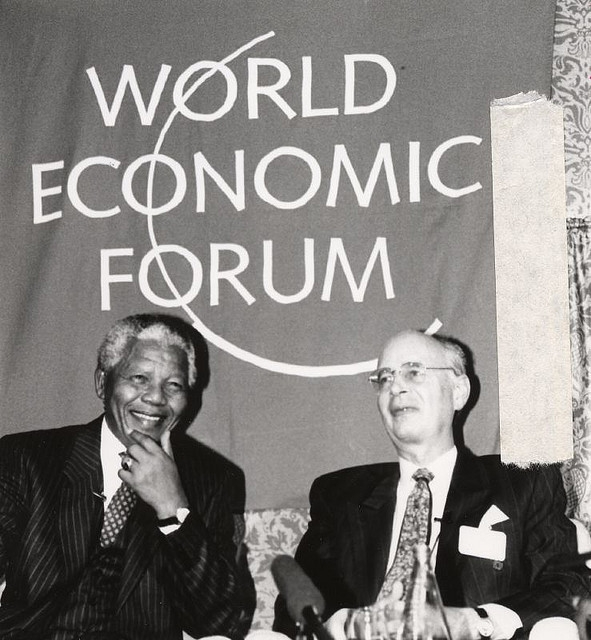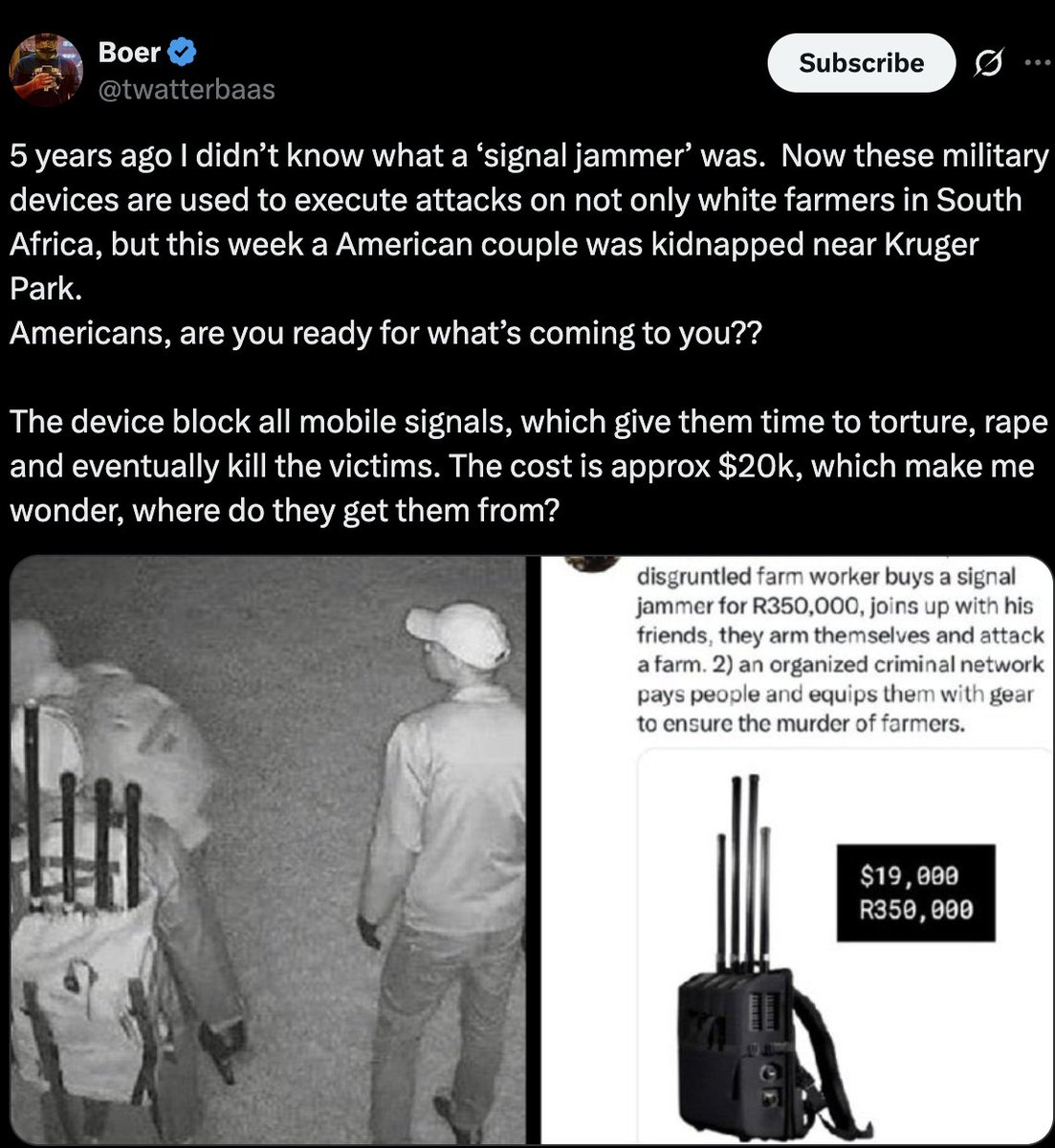This is why the powers that be absolutely despise Orania by the way
It shows the way out of the current crime problem, so those relying on anarcho-tyranny to solidify their rule hate it more than you can imagine
I'll explain more in the 🧵👇

It shows the way out of the current crime problem, so those relying on anarcho-tyranny to solidify their rule hate it more than you can imagine
I'll explain more in the 🧵👇
https://twitter.com/Will_Tanner_1/status/1821281109570674766

For those who don't know, Orania, which @Volkstaat10 does a great job publicizing, is the Boer community in rural South Africa that serves as a safe haven of sorts from the anarcho-tyranny that is the rest of South Africa
It has its own currency, maintains Christian values, and generally serves as a way for those who wish to exit from South African society. It's much the same impulse, though even more total, as the one behind @extradeadjcb's @exit_org

It has its own currency, maintains Christian values, and generally serves as a way for those who wish to exit from South African society. It's much the same impulse, though even more total, as the one behind @extradeadjcb's @exit_org


Key to Orania's success is that it is Afrikaner only. The Afrikaners there do their own work, no maker how dirty, without relying on external, African labor. This is what their symbol, the child rolling up his sleeve, symbolizes
The result of that hard work is that they keep their community rooted in Afrikaner tradition and free of the caustic policies of South Africa generally, namely its DEI insanity. They can grow, work, and prosper without having affirmative action mongers shoving race communism down their throats
The result of that hard work is that they keep their community rooted in Afrikaner tradition and free of the caustic policies of South Africa generally, namely its DEI insanity. They can grow, work, and prosper without having affirmative action mongers shoving race communism down their throats

The other side of the Afrikaner-only coin is that the media frequently and unfairly slanders it as a "whites only" town in which racists...well it's not clear what exactly the hand-ringers thing is going on; as is evident from the pictures, all they're doing is building a nice community

But regardless of Oranians not presenting a threat to anyone or anything but the Rainbow Nation's post-1994 founding myth, the media, and critics smear it and try to get the government to destroy it.
Orania is enshrined in the South African constitution, and so it's protected by that provision, but given the anarcho-tyranny present in the country, is probably more protected by South Africa's declining state capacity

Orania is enshrined in the South African constitution, and so it's protected by that provision, but given the anarcho-tyranny present in the country, is probably more protected by South Africa's declining state capacity


What ties the whole project together is that Orania can, and does, defend itself.
For one, it screens residents, and even visitors, requiring guests to get permission to visit before they can do so
More than that, it can actually defend itself: the citizens of it are armed, trained, and united by the ties that bind to such an extent that they will defend it. Like America in its frontier days, the Oranians have guns, carry them, and are ready to use them
The result is a peaceful society with nearly non-existent crime, much unlike everywhere else in South Africa
For one, it screens residents, and even visitors, requiring guests to get permission to visit before they can do so
More than that, it can actually defend itself: the citizens of it are armed, trained, and united by the ties that bind to such an extent that they will defend it. Like America in its frontier days, the Oranians have guns, carry them, and are ready to use them
The result is a peaceful society with nearly non-existent crime, much unlike everywhere else in South Africa

The smears of Orania are absurd. For example, a black writer visited, was treated with kindness and hospitality, and then smeared the little community, titling his article, "Inside creepy ‘Whites Only’ village Orania with own currency and bizarre rules… including asking permission for visitors"
He the article, he described the rules as "bizarre," saying, "The village has its own national holidays, its own currency - the Ora - and day-to-day life is governed by a bizarre set of rules including having to seek permission from the town council before receiving visitors."
Hilariously, he also tried to dispute the fact that Orania has nearly no crime, claiming that merely the statistics were different. "Local estate agent Marli says business is booming as more Afrikans - who make up just four per cent of the population - seek a safe haven from South Africa's crime-ridden townships. The country has one of the highest crime rates in the world, with a murder rate of 45 per 100,000, compared to 6.3 in the US and under one per cent in the UK. While the community has often claimed to be "crime-free", this has been widely disputed by others who claim statistics are not gathered there as they would be in the rest of the country," he said.
He the article, he described the rules as "bizarre," saying, "The village has its own national holidays, its own currency - the Ora - and day-to-day life is governed by a bizarre set of rules including having to seek permission from the town council before receiving visitors."
Hilariously, he also tried to dispute the fact that Orania has nearly no crime, claiming that merely the statistics were different. "Local estate agent Marli says business is booming as more Afrikans - who make up just four per cent of the population - seek a safe haven from South Africa's crime-ridden townships. The country has one of the highest crime rates in the world, with a murder rate of 45 per 100,000, compared to 6.3 in the US and under one per cent in the UK. While the community has often claimed to be "crime-free", this has been widely disputed by others who claim statistics are not gathered there as they would be in the rest of the country," he said.

Whatever his ramblings, the truth is that Orania is quite safe and secure, which contrasts mightily with the horrific crime situation in South Africa generally
https://x.com/Will_Tanner_1/status/1821582180491149381
Particularly, it's very different from the general situation the Boer farmers find themselves in, where marauding gangs of thugs attack them near-daily and commit murder nearly weekly
Those farms are isolated, and so prey to attackers. Orania, by contrast, is a united community that, because of its numbers and shared purpose, is willing and able to defend itself
Those farms are isolated, and so prey to attackers. Orania, by contrast, is a united community that, because of its numbers and shared purpose, is willing and able to defend itself

As "liberal democracy" rots every country that adopts it, turning everywhere into Zimbabwe, the world is a much, much more dangerous place. Further, it's getting more so every day
The solution to that, if one cares about his family, is to get them to a haven like Orania. Doing so might present temporary pain and annoyance, but is much better than seeing a child drowned in boiling water (a farm murder atrocity, as @k9_reaper noted in a recent podcast interview), out of an unwillingness to make a move
Further, in a time when all world differences and culture are being subsumed by globohomo's Marvel movies and rap "music," Orania has preserved historic Afriker culture
That is worth a great deal, and is something that more ought try to do
The solution to that, if one cares about his family, is to get them to a haven like Orania. Doing so might present temporary pain and annoyance, but is much better than seeing a child drowned in boiling water (a farm murder atrocity, as @k9_reaper noted in a recent podcast interview), out of an unwillingness to make a move
Further, in a time when all world differences and culture are being subsumed by globohomo's Marvel movies and rap "music," Orania has preserved historic Afriker culture
That is worth a great deal, and is something that more ought try to do

If you found this post interesting, check out my recent thread on crime in South Africa:
https://x.com/Will_Tanner_1/status/1821582177064382501
And read about Rhodesia here: theamericantribune.news/p/why-rhodesia…
And if you are from Orania or know someone there who would like to connect, I would love to do an interview! Please just reach out via DM
• • •
Missing some Tweet in this thread? You can try to
force a refresh


















